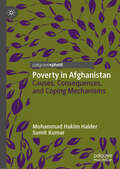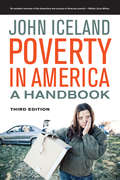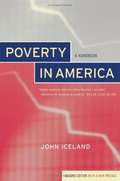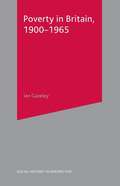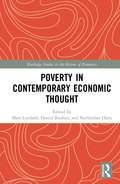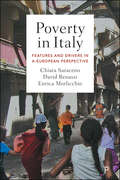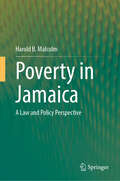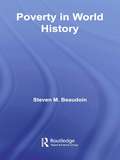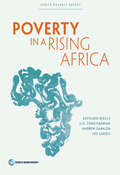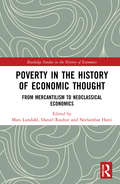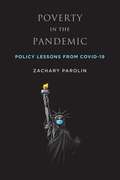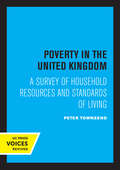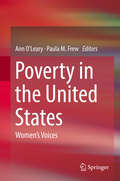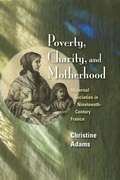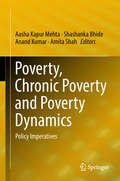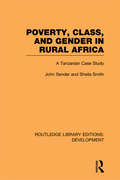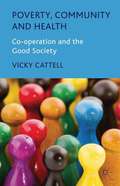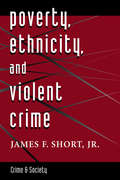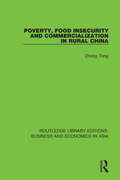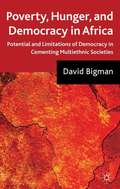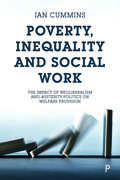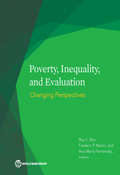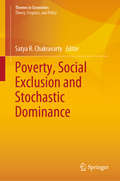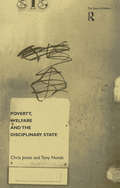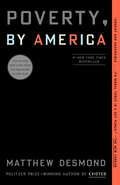- Table View
- List View
Poverty in Afghanistan: Causes, Consequences, and Coping Mechanisms
by Sumit Kumar Mohammad Hakim HaiderThis book examines the patterns, characteristics, causes and coping mechanisms of the poor in Afghanistan applying econometric and statistical techniques. The authors address and identify the extent of poverty in Afghanistan over the years, the spatial patterns and regional imbalances of poverty in Afghanistan, the distinguishing characteristics of the poor in Afghanistan, and explore shocks faced by the poor in Afghanistan as well as subsequent coping strategies. Based on household level data collected under the ‘National Risk Vulnerability Assessment’ (NRVA) survey of 2003, 2005, 2007/08 and 2011/12 of Afghanistan, the authors identify options that may enable policy makers and other stakeholders to further enable the inclusion of the poor in development processes and to successfully cope with poverty and its adverse outcomes. This short book will be of interest to students, researchers, academicians, policymakers, international agencies and NGOs at international and national levels.
Poverty in America
by John IcelandThe United States is among the most affluent nations in the world and has its largest economy; nevertheless, it has more poverty than most countries with similar standards of living. Growing income inequality and the Great Recession have made the problem worse. In this thoroughly revised edition of Poverty in America, Iceland takes a new look at this issue by examining why poverty remains pervasive, what it means to be poor in America today, which groups are most likely to be poor, the root causes of poverty, and the effects of policy on poverty. This new edition also includes completely updated data and extended discussions of poverty in the context of the Tea Party and Occupy Wall Street movements as well as new chapters on the Great Recession and global poverty. In doing so this book provides the most recent information available on patterns and trends in poverty and engages in an open and accessible manner in current critical debates.
Poverty in America: A Handbook (2nd edition)
by John IcelandA broad overview of poverty in the U.S., probing the various ways that it has been measured over time and the evolution of social thinking about poverty. Updated tables and a new preface.
Poverty in Britain, 1900–1965
by Ian GazeleyHow was poverty measured and defined, and how has this influenced our judgement of the change in poverty in Britain during the first sixty years of the twentieth century? During this period, a large number of poverty surveys were carried out, the methods of which altered after World War II. Commencing with Rowntree's social survey of York in 1899 and ending with Abel-Smith and Townsend's Poor and the Poorest in 1965, Ian Gazeley shows how the means of evaluation and the causes of poverty changed. Poverty in Britain, 1900-1965: - offers a comprehensive empirical assessment of all published poverty and nutritional enquiries in this era - reports the results of recent re-examinations of many of the more famous social surveys that took place - considers the results of these surveys within the context of changing real incomes, the occupational structure and social provision - evaluates the extent to which the reduction in poverty was due to the actions of the State or to increases in real income (including more continuous income from fuller employment) Detailed yet easy to follow, Ian Gazeley's book is an indispensable guide to the changing face of poverty in Britain during the first six decades of the last century.
Poverty in Contemporary Economic Thought (Routledge Studies in the History of Economics)
by Mats Lundahl Neelambar Hatti Daniel RauhutPoverty in Contemporary Economic Thought aims to describe and critically examine how economic thought deals with poverty, including its causes, consequences, reduction and abolition. This edited volume traces the ideas of key writers and schools of modern economic thought across a significant period, ranging from Friedrich Hayek and Keynes to latter-day economists like Amartya Sen and Angus Deaton. The chapters relate poverty to income distribution, asserting the point that poverty is not always conceived of in absolute terms but that relative and social deprivation matters also. Furthermore, the contributors deal with both individual poverty and the poverty of nations in the context of the international economy. In providing such a thorough exploration, this book shows that the approach to poverty differs from economist to economist depending on their particular interests and the main issues related to poverty in each epoch, as well as the influence of the intellectual climate that prevailed at the time when the contribution was made. This key text is valuable reading for advanced students and researchers of the history of economic thought, economic development and the economics of poverty.
Poverty in Italy: Features and Drivers in a European Perspective
by Chiara Saraceno David BenassiThree experienced Italian sociologists explore the structural and cultural dimensions of poverty in their country. Comparing Italy’s regime with other European countries, they consider the interplay of conditions in the labour market, the family and welfare arrangements as causes of poverty. This in-depth analysis explores how forced familialism, unbalanced gender arrangements, territorial cleavages and sluggish growth have rendered Italy vulnerable to financial crisis. As old risks of poverty have worsened, new risks have emerged and children, the working poor and migrants have become the ‘new poor’. Combining theoretical and empirical tools, this is a topical fresh take on the understanding of poverty in Italy that is even more crucial considering the impact of the COVID-19 pandemic.
Poverty in Jamaica: A Law and Policy Perspective
by Harold B. MalcolmThis book examines the genesis of poverty in Jamaica and how policies and laws related to social and economic rights can help with the promotion and protection of human rights as part of a broader worldview of human dignity. It explores the scope of the country’s obligations and capabilities in line with its municipal and international obligations. It sets out through the policy lenses of the New Haven School of Jurisprudence to understand how Jamaica can fulfil these obligations in a meaningful way to impact the daily lives of its people. Through a historical survey to the present-day Jamaica, the exploration uses the theoretical frame of the New Haven School of Jurisprudence which underscores human dignity as being paramount to the attainment of human progress and development. The trajectory of the modern human rights movement and constitutional apparatus of nation states help to reinforce and entrench the ways, standards and norms relating to social and economic rights are observed. This, too, is a consideration for this small island state in the Northern Caribbean. However, the jurisprudential question is how the interpretation of laws, and the implementation of policies can be synchronized as conditioning factors of a global consensus on human dignity especially for the most vulnerable. Socio economic rights underscore a public morality though their potential enforcement is often criticized as too vague and imprecise for lasting or meaningful effect. The New Haven School of Jurisprudence with its emphasis on human dignity in the world community points to a new approach to the egregious human rights violations caused by poverty and the part played by these second-generation rights. The book combines academic rigor with substantial hands-on legal experience, and will be of interest to scholars, practitioners, and policymakers focused on human rights in the region.
Poverty in World History (Themes in World History)
by Steven M. BeaudoinA genuinely global survey of world poverty from 1500 to the present day, Poverty in World History focuses upon the period from around 1500 onwards when poverty became a global issue, and uses the process of globalization as the chief lens through which to study and understand poverty in world history. The result is both a tying together of significant strands of world history, and an examination of changing attitudes towards poverty and poor relief throughout the world. This wide ranging study underscores a major consequence of increased cultural and economic interaction among the world's societies, highlighting the similarities and differences in impacts and responses to the resulting 'smaller' globe. Topics include: innovations in early modern poor relief the causes of trends towards a globalization of poverty after 1500 poor relief since 1945 to the present poverty, morality and the state.
Poverty in a Rising Africa
by Kathleen Beegle Luc Christiaensen Andrew Dabalen Isis GaddisPerceptions of Africa have changed dramatically. Viewed as a continent of wars, famines and entrenched poverty in the late 1990s, there is now a focus on "Africa rising ? and an "African 21st century. ? Two decades of unprecedented economic growth in Africa should have brought substantial improvements in well-being. Whether or not they did, remains unclear given the poor quality of the data, the nature of the growth process (especially the role of natural resources), conflicts that affect part of the region, and high population growth. Poverty in a Rising Africa documents the data challenges and systematically reviews the evidence on poverty from monetary and nonmonetary perspectives, as well as a focus on dimensions of inequality. Chapter 1 maps out the availability and quality of the data needed to track monetary poverty, reflects on the governance and political processes that underpin the current situation with respect to data production, and describes some approaches to addressing the data gaps. Chapter 2 evaluates the robustness of the estimates of poverty in Africa. It concludes that poverty reduction in Africa may be slightly greater than traditional estimates suggest, although even the most optimistic estimates of poverty reduction imply that more people lived in poverty in 2012 than in 1990. A broad-stroke profile of poverty and trends in poverty in the region is presented. Chapter 3 broadens the view of poverty by considering nonmonetary dimensions of well-being, such as education, health, and freedom, using Sen's (1985) capabilities and functioning approach. While progress has been made in a number of these areas, levels remain stubbornly low. Chapter 4 reviews the evidence on inequality in Africa. It looks not only at patterns of monetary inequality in Africa but also other dimensions, including inequality of opportunity, intergenerational mobility in occupation and education, and extreme wealth in Africa.
Poverty in the History of Economic Thought: From Mercantilism to Neoclassical Economics (Routledge Studies in the History of Economics)
by Mats Lundahl Neelambar Hatti Daniel RauhutPoverty in the History of Economic Thought: From Mercantilism to Neoclassical Economics aims to describe and critically examine how economic thought deals with poverty and the poor, including its causes, consequences, reduction, and abolition. This edited volume traces the economic ideas of key writers and schools of thought across a significant period, ranging from Adam Smith and Malthus through to Wicksell, Cassel, and Heckscher. The chapters relate poverty to income distribution, asserting that poverty is not always conceived of in absolute terms, and that relative and social deprivation matter also. Furthermore, the contributors deal with both individual poverty and the poverty of nations in the context of international economy. By providing such a thorough exploration, this book shows that the approach to poverty differs from economist to economist, depending on their particular interests and the main issues related to poverty in each epoch, as well as the influence of the intellectual climate that prevailed at the time when the contribution was made. This key text is valuable reading for advanced students and researchers of the history of economic thought, economic development, and the economics of poverty.
Poverty in the Pandemic: Policy Lessons from COVID-19
by Zachary ParolinAt the close of 2019, the United States saw a record-low poverty rate. At the start of 2020, the COVID-19 pandemic threatened to upend that trend and plunge millions of Americans into poverty. However, despite the highest unemployment rate since the Great Depression, the poverty rate declined to the lowest in modern U.S. history. In Poverty in the Pandemic social policy scholar Zachary Parolin provides a data-driven account of how poverty influenced the economic, social, and health consequences of the COVID-19 pandemic in the U.S., as well as how the country’s policy response led to historically low poverty rates. Drawing on dozens of data sources ranging from debit and credit card spending, the first national databases of school and childcare center closures in the U.S., and bi-weekly Census-run surveys on well-being, Parolin finds that entering the pandemic in poverty substantially increased a person’s likelihood of experiencing negative health outcomes due to the pandemic, such as contracting and dying from COVID, as well as losing their job. Additionally, he found that students from poor families suffered the greatest learning losses as a result of school closures and the shift to distance learning during the pandemic. However, unprecedented legislative action by the U.S. government, including the passage of the Families First Coronavirus Response Act (FFCRA), the Coronavirus Aid, Relief, and Economic Security (CARES) Act, and the American Rescue Plan (ARP) helped mitigate the economic consequences of the pandemic and lifted around 18 million Americans out of poverty. Based on the success of these policies, Parolin concludes with policy suggestions that the U.S. can implement in more ‘normal’ times to improve the living conditions of low-income households after the pandemic subsides, including expanding access to Unemployment Insurance, permanently expanding the Child Tax Credit, promoting greater access to affordable, high-quality healthcare coverage, and investing more resources into the Census Bureau’s data-collection capabilities. He also details a method of producing a monthly measurement of poverty, to be used in conjunction with the traditional annual measurement, in order to better understand the intra-year volatility of poverty that many Americans experience. Poverty in the Pandemic provides the most complete account to date of the unique challenges that low-income households in the U.S. faced during the COVID-19 pandemic.
Poverty in the United Kingdom: A Survey of Househould Resources and Standards of Living
by Peter TownsendThis title is part of UC Press's Voices Revived program, which commemorates University of California Press’s mission to seek out and cultivate the brightest minds and give them voice, reach, and impact. Drawing on a backlist dating to 1893, Voices Revived makes high-quality, peer-reviewed scholarship accessible once again using print-on-demand technology. This title was originally published in 1979.
Poverty in the United States
by Ann O'Leary Paula M. FrewThis important text explores the deep relationships between poverty, health/mental health conditions, and widespread social problems as they affect the lives of low-income women. A robust source of both empirical findings and first-person descriptions by poor women of their living conditions, it exposes cyclical patterns of structural and environmental stressors contributing to impaired physical and mental health. Psychological conditions (notably depression and PTSD), substance use and abuse, domestic and gun-related violence, relationship instability, and hunger in low-income communities, especially among women of color, are discussed in detail. In terms of solutions, the book's contributors identify areas for major policy reform and make potent recommendations for community outreach, wide-scale intervention, and sustained advocacy. Among the topics covered: * The intersection of women's health and poverty. * Poverty, personal experiences of violence, and mental health. * The role of social support for women living in poverty. * The logic of exchange sex among women living in poverty. * Physical safety and neighborhood issues. * Exploring the complex intersections between housing environments and health behaviors among women living in poverty. A stark reminder that health should be considered a basic human right, Poverty in the United States: Women's Voices is a necessary reference for research professionals particularly interested in women's studies, HIV/AIDS prevention, poverty, and social policy.
Poverty, Charity, and Motherhood: Maternal Societies in Nineteenth-Century France
by Christine AdamsThis far-reaching study of maternal societies in post-revolutionary France focuses on the philanthropic work of the Society for Maternal Charity, the most prominent organization of its kind. Administered by middle-class and elite women and financed by powerful families and the government, the Society offered support to poor mothers, helping them to nurse and encouraging them not to abandon their children. In Poverty, Charity, and Motherhood, Christine Adams traces the Society's key role in shaping notions of maternity and in shifting the care of poor families from the hands of charitable volunteers with religious-tinged social visions to paid welfare workers with secular goals such as population growth and patriotism. Adams plumbs the origin and ideology of the Society and its branches, showing how elite women in Paris, Lyon, Bordeaux, Rouen, Marseille, Dijon, and Limoges tried to influence the maternal behavior of women and families with lesser financial means and social status. A deft analysis of the philosophy and goals of the Society details the members' own notions of good mothering, family solidarity, and legitimate marriages that structured official, elite, and popular attitudes concerning gender and poverty in France. These personal attitudes, Adams argues, greatly influenced public policy and shaped the country's burgeoning social welfare system.
Poverty, Chronic Poverty and Poverty Dynamics: Policy Imperatives
by Anand Kumar Amita Shah Aasha Kapur Mehta Shashanka BhideThis book discusses critical policy issues that need to be addressed if India wishes to achieve the SDG 1 based elusive goal of ending poverty in the country. In its nine chapters, it takes the readers through trends and estimates of poverty in India, explains changes in the way it has been measured over time and the factors that lead to persistence of poverty, draws attention to the fact that hunger is both a cause and an effect of poverty and has gender and age dimensions too. The book revisits strategies that were successful in addressing poverty emanating from situations of conflict, presents a discussion on migration as a critical coping mechanism among poor, analyses the links between ill health and poverty as well as education and poverty to draw attention to the policy imperatives that need attention.India’s report card on poverty remains dismal even though there is recognition of the importance of reducing or eliminating or ending it at both national and global levels. Despite rapid economic growth and improvement on a range of development indicators, an unacceptably high proportion of India’s population continues to suffer poverty in multiple dimensions. SDG 1 or “ending poverty in all its forms everywhere” cannot be achieved unless policies and poverty alleviation programmes understand and address chronic poverty and its dynamics. This requires that we estimate and understand the extent of poverty, the factors that lead to people getting stuck in it and the ways this can be addressed. It also requires understanding the dynamic nature of poverty or the fact that many of those who are poor are able to move out of poverty as well as the fact that many others who are not poor become impoverished. These are the issues that are comprehensively examined and addressed in this book.In addition to students, teachers and researchers in the areas of development, economic growth, equity and welfare, the book is also of great interest to policy makers, planners and non‐government agencies who are concerned with understanding and addressing poverty-related issues in the developing countries.
Poverty, Class and Gender in Rural Africa: A Tanzanian Case Study (Routledge Library Editions: Development)
by Sheila Smith John SenderFocussing on a Fieldwork study of the West Usambaras in Tanzania, this study, first published in 1990, deals with processes of class formation and capitalist accumulation, and the dynamics of rural poverty and gender relations. Arguing that rural differentiation is systematically reinforced by the socialist state, the authors offer a critique of government intervention and discuss alternative, more effective forms of policy.
Poverty, Community and Health
by Vicky CattellDespite plentiful evidence on poverty and reduced health chances and on the benefits of co-operative social networks and social capital, the nature of the relationship between them remains uncertain. Yet an enhanced understanding is needed if we are to gain, not only a more effective purchase on social processes involved in well-being, or on links between poverty and place, but also of the stratagems people adopt to challenge or cope with social and economic difficulties and resist their deleterious effects. Drawing on key concepts and on community studies conducted in East London housing estates, this book brings together diverse strands of influence on participatory community life and individual well-being. Residents' rich narratives are used to emphasize the significance of different social network patterns for mediating disadvantage and happiness. The book makes a timely contribution to post 2010 policy agendas and to current political debates on the 'big society' and the 'good society'.
Poverty, Ethnicity, And Violent Crime (Crime And Society Ser.)
by James F. Short Jr.Violent crime in America is more strongly associated with poverty and with changing social and economic conditions than with race or ethnicity, and patterns of violence are changing. These are among the conclusions of Poverty, Ethnicity, and Violent Crime, a searching analysis that draws on scholarly research from all the social and behavioral sciences. By framing his analysis in terms of different levels of explanation, James Short is able to identify fundamental causal conditions and processes that result in violent crime. The book also examines current policies and political and scholarly controversies concerning the control of violent crime. This book can serve as a text or as supplementary reading for a variety of criminology courses. }Violent crime in America is more strongly associated with poverty and with changing social and economic conditions than with race or ethnicity, and patterns of violence are changing. These are among the conclusions of Poverty, Ethnicity, and Violent Crime, a searching analysis that draws on scholarly research from all the social and behavioral sciences. By framing his analysis in terms of different levels of explanation, James Short is able to identify fundamental causal conditions and processes that result in violent crime. The book also examines current policies and political and scholarly controversies concerning the control of violent crime. This book can serve as a text or as supplementary reading for a variety of criminology courses. }
Poverty, Food Insecurity and Commercialization in Rural China (Routledge Library Editions: Business and Economics in Asia #28)
by Zhong TongThis study, first published in 1993, analyses the relationship among poverty, food insecurity and commercialization in rural China by employing agricultural household models. Data are derived from a 10,000 household subsample of the annual rural household consumption and expenditure survey.
Poverty, Hunger, and Democracy in Africa
by David BigmanThe book evaluates alternative policy options for the African countries to overcome the food crisis and the changing structure of world trade to sustain their impressive growth of the early 2000s. These policies must go beyond economic reforms and seek a solution to the entrenched political problems that divided the continent.
Poverty, Inequality and Social Work: The Impact of Neo-Liberalism and Austerity Politics on Welfare Provision
by Ian CumminsThis book offers a critical, sociological analysis of the domino effect of neoliberalism and austerity politics on the role of social work and wider welfare provision. It argues that social work should move away from the resultant emphasis on risk management and bureaucracy, and return to a focus on relational and community approaches as the cornerstone of practice. Applying theoretical frameworks to practice, including those of Bourdieu and the recent work of Wacquant, the book examines the development of neoliberal ideas and their impact on social welfare. It explores the implications of this across a range of areas of social work practice, including work with children and families, working with asylum seekers and refugees and mental health social work.
Poverty, Inequality, and Evaluation
by Ray C. Rist Frederic P. Martin Ana Marãa FernandezThe basic premise of this book is that the conversation on the future of development needs to shift from a focus on poverty to that of inequality. The poverty emphasis is in an intellectual and political cul de sac. It does not address the fundamental question of why people are poor nor what can be done structurally and institutionally to reduce and eliminate it. The various chapters illustrate in the context of various countries and sectors around the world, the significant contributions that evaluators can make in terms of improvement of the analytical framework, analysis of the performance and results of specific programs and projects, as well as assessing and designing better public management systems in terms of poverty and inequality reduction. Beyond the specific contributions presented, three characteristics characterize those evaluations to be relevant for poverty and inequality analysis: a global-local approach: Global to move beyond disciplinary boundaries and consider cross-cutting issues, local to account for the diversity of countries, sectors, institutions and cultures considered; a problem-solving orientation: The issue evaluated is the core focus and determines the choice of evaluation methods to analyze this issue from a variety of angles; an evolutionary approach: Chapters presented are from iconoclasts who do not have any pre-established theory or school of thought to defend. This is the result of openness of mind and ability to adapt the analytical framework, the evaluation methods, and the interpretation of results in a constant interaction with the stakeholders. Such characteristics make evaluation a domain that can help understand better complex issues like poverty, inequality, vulnerability, and their interactions as well as propose a relevant and useful theory of change for public policies and projects to improve the plight of a large part of the world population in industrialized and developing countries alike.
Poverty, Social Exclusion and Stochastic Dominance (Themes in Economics)
by Satya R. ChakravartyThis book honors the memory of Tony Atkinson, who made significant contributions to the rigorous study of income inequality, poverty, and redistribution. These essays presented, covering a span of over 30 years of research and scholarship, have been at the forefront of distributional analysis, and many of them are of prime importance for contemporary developments in the real-valued measurement of poverty and inequality, with particular reference to the concepts of fuzzy poverty assessment, vulnerability, heterogeneity/multidimensionality, unit consistency, sub-group decomposability, and dominance criteria. While all of these articles have been previously published—singly or with co-authorship—in a number of professional journals or distinguished edited volumes, this book is greatly enriched by a substantial introductions by the authors, which place the contributions in context, highlights their inter-connectedness, and relates them to the work of Tony Atkinson and other scholars. This book is of intrinsic value to welfare analysts, as well as being a tribute to a very great scholar by a fellow economist.
Poverty, Welfare and the Disciplinary State (The\state Of Welfare Ser.)
by Chris Jones Tony NovakA forward-looking appraisal of the welfare state which examines issues such as poverty in Britain, demonisation of the poor in areas of social policy and other related topics.
Poverty, by America
by Matthew Desmond#1 NEW YORK TIMES BESTSELLER • The Pulitzer Prize–winning author of Evicted reimagines the debate on poverty, making a &“provocative and compelling&” (NPR) argument about why it persists in America: because the rest of us benefit from it.A BEST BOOK OF THE YEAR: The New Yorker, The New York Times Book Review, NPR, Oprah Daily, Time, The Star Tribune, Vulture, The Christian Science Monitor, Chicago Public Library, Esquire, California Review of Books, She Reads, Library Journal&“Urgent and accessible . . . Its moral force is a gut punch.&”—The New YorkerLonglisted for the Inc. Non-Obvious Book Award • Longlisted for the Andrew Carnegie Medal The United States, the richest country on earth, has more poverty than any other advanced democracy. Why? Why does this land of plenty allow one in every eight of its children to go without basic necessities, permit scores of its citizens to live and die on the streets, and authorize its corporations to pay poverty wages? In this landmark book, acclaimed sociologist Matthew Desmond draws on history, research, and original reporting to show how affluent Americans knowingly and unknowingly keep poor people poor. Those of us who are financially secure exploit the poor, driving down their wages while forcing them to overpay for housing and access to cash and credit. We prioritize the subsidization of our wealth over the alleviation of poverty, designing a welfare state that gives the most to those who need the least. And we stockpile opportunity in exclusive communities, creating zones of concentrated riches alongside those of concentrated despair. Some lives are made small so that others may grow. Elegantly written and fiercely argued, this compassionate book gives us new ways of thinking about a morally urgent problem. It also helps us imagine solutions. Desmond builds a startlingly original and ambitious case for ending poverty. He calls on us all to become poverty abolitionists, engaged in a politics of collective belonging to usher in a new age of shared prosperity and, at last, true freedom.
